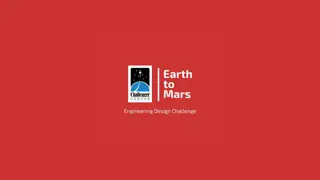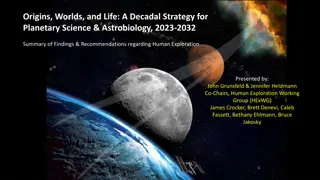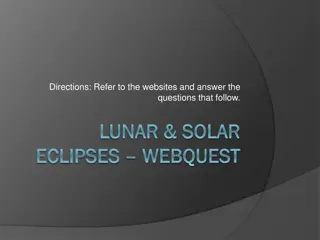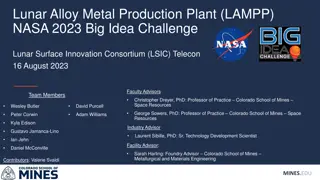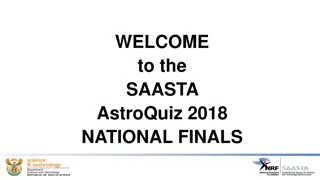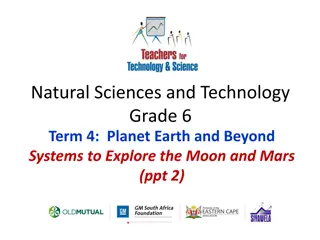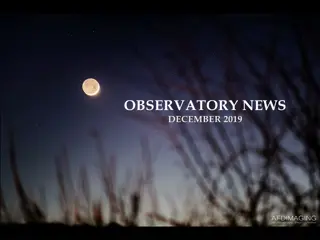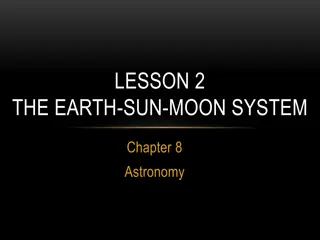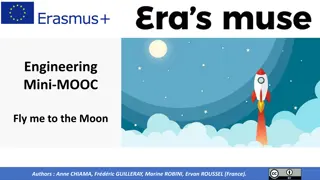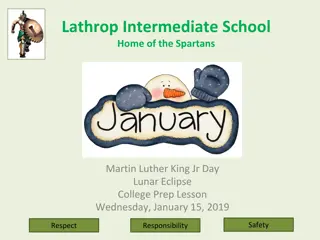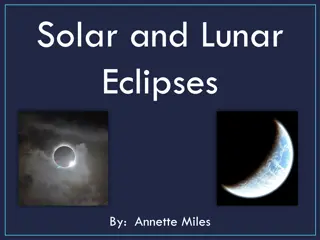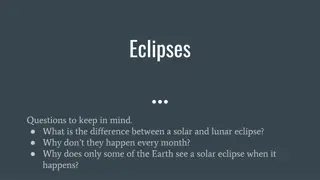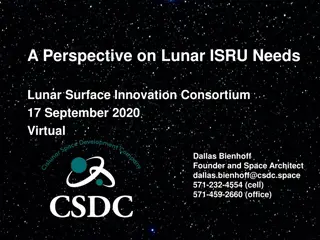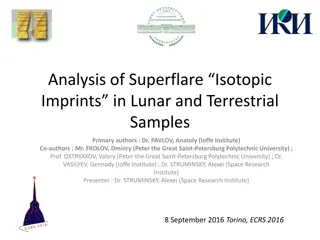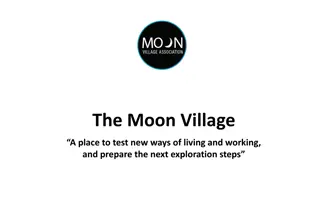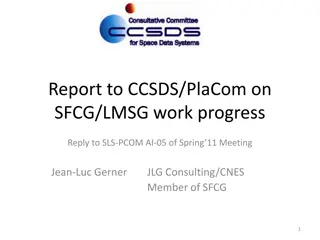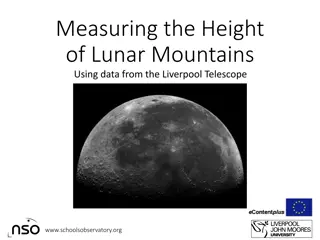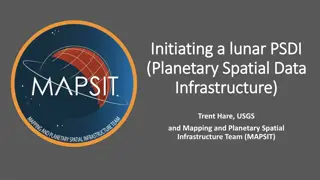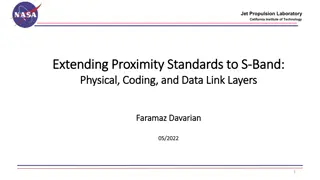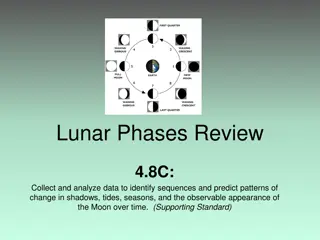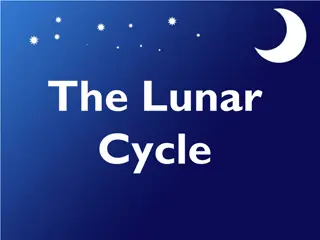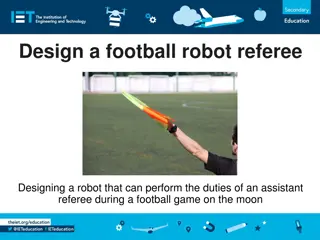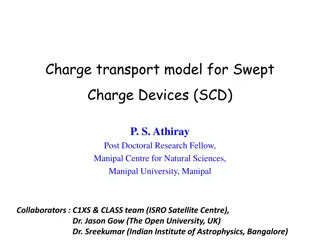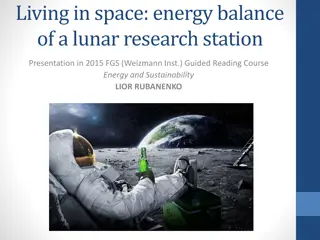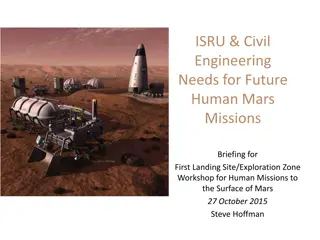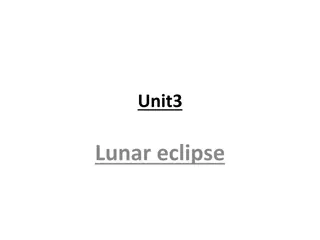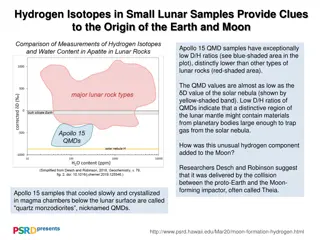2024 Lunar New Year Preprations
The celebration for Chinese New Year 2024 started on February 10. New Year is almost here, also called the Lunar New Year. It brings a happy celebration full of tradition and culture.
177 views • 22 slides
NASA Integrated Lunar Science Strategy in the Artemis Era Implementation Plan
This implementation plan outlines strategic lunar programs, human exploration missions, and science objectives to achieve decadal-level goals at the Moon. It addresses the recommendations for lunar science priorities and aims to integrate human exploration with robotic missions for enhanced scientif
42 views • 20 slides
Latest Updates and Action Requests from LEAG - November 2023 Edition
LEAG presents exciting developments in lunar activities including team selections, upcoming commercial moon landings, and initiatives towards an International Lunar Year. Additionally, LEAG responds to a NASA request regarding the maintenance of the Mean Earth Coordinate System for the Moon, emphasi
3 views • 37 slides
get⚡[PDF]❤ Building Habitats on the Moon: Engineering Approaches to Lunar Settle
\"COPY LINK HERE ; https:\/\/getpdf.readbooks.link\/3319682423\n\n[PDF READ ONLINE] Building Habitats on the Moon: Engineering Approaches to Lunar Settlements (Springer Praxis Books) | Building Habitats on the Moon: Engineering Approaches to Lunar Settlements (Springer Praxis Books)\n\"\n
1 views • 6 slides
Understanding Solar and Lunar Eclipses
Explore the fascinating phenomena of solar and lunar eclipses, learning about the differences between them, how they occur, and why they do not happen every month. Discover the types of eclipses and their characteristics, from total solar eclipses to partial lunar eclipses. Delve into the science be
4 views • 40 slides
National Aeronautics and Space Administration Moon-to-Mars Strategy Update
Evolving projects, timelines, and architectural updates of the National Aeronautics and Space Administration's Moon-to-Mars strategy are discussed in detail, highlighting objectives, architecture components, analytical capabilities, and future segments. The strategy aims to achieve constancy of purp
3 views • 16 slides
Hardware Demonstration and Improvements of the Stellar Positioning System
The Hardware Demonstration and Improvements of the Stellar Positioning System (SPS) involve utilizing ancient celestial navigation techniques for lunar exploration. SPS combines central-body-relative observation with star-field observation to determine absolute position, reducing mass/power impacts
5 views • 14 slides
Exploring Moon Phases and Lunar Basics
Delve into the fascinating world of moon phases and lunar phenomena. Learn about the different phases of the moon, why we see the moon, rotation, revolution, waxing, waning, and more.
8 views • 32 slides
Exploring Lunar Surface Radiation Risks and Mitigations Using Bioengineering
Lunar Explorer Instrument for space biology applications, LEIA Mission, addresses radiation health risks for crewed lunar exploration. The project aims to engineer yeast strains to study radiation sensitivity and identify genetic factors affecting cellular response. The instrument suite includes Bio
6 views • 8 slides
Designing a Sustainable Mars Habitat for Long-term Crew Stay
Design a Mars habitat for the first human crew that will be staying on Mars for several years. The habitat must include essential components such as sleeping quarters, restroom, exercise room, radiation shielding, food/water supply, entertainment, and ISRU technologies. Teams will research, create a
0 views • 7 slides
Exploration Strategy for Planetary Science & Astrobiology 2023-2032
The decadal strategy outlines a comprehensive plan for planetary science and astrobiology, emphasizing the integration of human exploration activities with scientific objectives. Key elements include leveraging planned human space missions for new scientific opportunities and identifying areas of pl
9 views • 10 slides
Understanding Lunar and Solar Eclipses: A Comprehensive Webquest
Delve into the intricacies of lunar and solar eclipses by exploring informative websites. Learn about lunar eclipse phases, types, and causes, sketch the Earth-Moon-Sun alignment, discover the reasons for eclipse frequency, and differentiate between the three lunar eclipse kinds. Unravel the mystery
0 views • 12 slides
Lunar Alloy Metal Production Plant (LAMPP) Concept and Objectives
The Lunar Alloy Metal Production Plant (LAMPP) is an innovative system designed for lunar environment, utilizing Molten Regolith Electrolysis (MRE) to extract oxygen and high-quality metals from lunar regolith. The project aims to unify knowledge on MRE technologies and test refractory materials for
0 views • 19 slides
SAASTA AstroQuiz 2018 National Finals - Lunar Eclipse Questions
The SAASTA AstroQuiz 2018 National Finals feature a series of questions related to lunar eclipses, moon characteristics, and celestial bodies. Participants must answer questions about the longest lunar eclipse of the 21st century, the color of the moon during an eclipse, and the relationship between
0 views • 54 slides
Exploration of the Moon: Vehicles and Tools Used in Grade 6 Natural Sciences and Technology
Explore the fascinating systems involved in investigating the Moon and Mars, focusing on the vehicles and tools used during exploration. Learn about the Lunar Rover, its specifications, and the tools astronauts utilized to collect rock samples on the Moon. Discover the challenges faced during the ea
3 views • 8 slides
Observatory News December 2019: Lunar and Dark Sky Observing Sessions Schedule
In December 2019, the observatory presents a schedule of lunar and dark sky observing sessions. The sessions include Lunar Sessions on December 6th, 7th, January 3rd, and 4th, as well as Dark Sky Sessions on December 20th, 21st, 23rd, 27th, 28th, 30th, and January 3rd. It is advised to check their w
1 views • 14 slides
Exploring Solar and Lunar Eclipses in Astronomy
Dive into the fascinating world of solar and lunar eclipses through vivid imagery and informative descriptions. Learn about the different types of eclipses, such as total and partial solar eclipses, as well as lunar eclipses caused by Earth's shadow. Discover the intricate dance between the Sun, Moo
0 views • 34 slides
Understanding Earth's Seasons and Moon Phases
Explore the primary causes of Earth's seasons, the positioning of winter in the Northern Hemisphere, and the eight phases of the lunar cycle. Learn about the characteristics of the moon in its waxing and waning phases, the time it takes to transition between moon phases, and the role of the sun in t
0 views • 24 slides
Exploring the Earth-Moon System in Astronomy
Investigate the fascinating interplay between Earth, the Moon, and the Sun including lunar phases, eclipses, tides, and more. Discover the Moon's unique characteristics and lunar landscape features captured by Apollo missions.
0 views • 37 slides
Design Your Moon Camp: Erasmus+ Mini-MOOC Project
Delve into the world of designing a Moon camp in this innovative Erasmus+ Mini-MOOC project. Participants are challenged to create a map of their ideal lunar settlement, considering the harsh lunar conditions such as lack of water, oxygen, high radiation, and scarce food sources. The project aims to
0 views • 4 slides
Exploring Passover: Symbolism of Spring and Jewish Calendar Insights
Learn about the Festival of Spring in Israel and the symbolism of Passover, commemorating the Israelites' exodus from Egypt. Discover the significance of Passover occurring in the spring and how the Hebrew calendar's lunar nature affects holiday seasonality. Explore Hebrew language connections to th
2 views • 11 slides
Lathrop Intermediate School Events and Lunar Eclipse Information
Lathrop Intermediate School, home of the Spartans, will be observing Martin Luther King Jr. Day and a total lunar eclipse on January 21, 2019. The school emphasizes safety, respect, and responsibility. The article includes details about the lunar eclipse, the significance of Martin Luther King Jr. D
0 views • 6 slides
Understanding Solar and Lunar Eclipses
Solar and lunar eclipses are celestial phenomena where shadows are cast by one celestial body upon another. A solar eclipse occurs when the Moon blocks the view of the Sun during the new moon phase, while a lunar eclipse happens when the Earth's shadow falls on the Moon. This article explains the di
0 views • 38 slides
Understanding Eclipses: Solar and Lunar Phenomena Explained
Explore the difference between solar and lunar eclipses, why they don't occur every month, and why only some parts of Earth witness solar eclipses. Discover how the Moon's orbit and shadows play a crucial role in these celestial events.
0 views • 7 slides
Exploring Water on the Moon: Research Insights from Lunar Missions
Uncover the intriguing research on water presence on the Moon through the Lunar Reconnaissance Orbiter and the Lunar Exploration Neutron Detector. Discover how remote sensing and neutron detection technologies have shaped our understanding of lunar water distribution, challenging previous theories.
0 views • 23 slides
Lunar ISRU Needs Perspective for Propellant Generation
The article discusses the lunar in-situ resource utilization (ISRU) needs for propellant generation, focusing on the specific propellant requirements for transportation services between Low Earth Orbit (LEO) and the Moon. It covers the importance of lunar resources such as sunlight, regolith, volati
0 views • 5 slides
Analysis of Superflare Isotopic Imprints in Lunar and Terrestrial Samples
Researchers investigate isotopic imprints in lunar and terrestrial samples to understand extreme solar events and their impact on atmospheric radiocarbon concentrations. Using 10Be and 36Cl data, they analyze the solar proton spectra and energy fluxes associated with these events, shedding light on
0 views • 13 slides
The Moon Village: A Vision for Sustainable Lunar Exploration
The Moon Village represents a collaborative effort among nations to establish a sustainable human presence on the Moon and in cis-lunar space. It aims to serve as a testing ground for new ways of living and working, fostering global cooperation in scientific research, education, and industry. The vi
0 views • 6 slides
Progress Report on Lunar-Mars Spectrum Group Work within SFCG
The Lunar-Mars Spectrum Group (LMSG) met to review important input documents related to lunar communications, including compatibility studies, frequency considerations, and frequency assignment guidelines. The group identified the need for further work to refine proposed reports and agreed on new ac
0 views • 17 slides
Estimating Lunar Mountain Heights with Shadow Lengths
Explore how to estimate the height of lunar mountains by measuring the length of their shadows on the Moon's surface using data from the Liverpool Telescope. Discover the intriguing world of lunar shadows and how they can reveal information about celestial features. See how similar triangles and geo
0 views • 14 slides
Initiating a Lunar Planetary Spatial Data Infrastructure (PSDI) by MAPSIT Steering Committee
MAPSIT, led by Trent Hare of USGS, advocates for creating a Lunar PSDI to enhance spatial data infrastructure in planetary science. The committee highlights the importance of foundational lunar data products and ongoing efforts for Europa and the Moon. Collaboration with various entities is emphasiz
0 views • 10 slides
Developing Lunar Proximity Standards for Enhanced Communication
Various commercial lunar relay systems are in development, emphasizing the urgent need for standardizing proximity signal formats for efficient communication between lunar payloads. Extending the current CCSDS Proximity-1 Standard to the S-band for the Moon is crucial due to differences in frequency
0 views • 10 slides
Explore Lunar Phases and Patterns in Astronomical Observations
Dive into the study of lunar phases, shadows, tides, seasons, and the moon's observable appearance over time. Test your knowledge with questions about moon phases, identify the sequence of moon phases, understand the causes behind moon phases, and determine the correct order of moon phases. Enhance
0 views • 13 slides
Understanding the Phases of the Moon and the Lunar Cycle
The moon goes through eight distinct phases during its 27-day Lunar Cycle, each characterized by its illumination level as seen from Earth. From the invisible New Moon to the fully illuminated Full Moon, learn about each phase and how they occur as the moon orbits the Earth.
0 views • 15 slides
Designing a Football Robot Referee for Lunar League Games
Design a robot assistant referee to support games played on the moon by indicating when the ball is out of play and retrieving it. The robot must also be sustainable, carry logos for fundraising, and operate effectively in the unique lunar environment. Safety precautions and thoughtful design consid
0 views • 9 slides
Charge Transport Model for Swept Charge Devices (SCD) in Astrophysics Research
Exploring the charge transport model for Swept Charge Devices (SCD) in collaboration with various institutions like ISRO Satellite Centre and e2V technologies Ltd. The research aims to enhance spectral response, reduce uncertainties, and improve global lunar elemental mapping using advanced X-ray sp
0 views • 30 slides
Energy Balance of Lunar Research Station: Challenges and Solutions
Delve into the energy balance of a lunar research station, exploring motivations for space living, past experiments like BIOS-3, and the project outline. The presentation discusses the use of algae or high vegetation for oxygen production, emphasizing the need for a sustainable environment in space.
0 views • 26 slides
ISRU & Civil Engineering Needs for Future Human Mars Missions Briefing
This briefing discusses the ICE Working Group's purpose, membership, and tasks related to identifying capabilities and resources essential for establishing a sustainable human presence on Mars. It outlines the criteria for site selection and the data sets required to support human surface missions o
0 views • 19 slides
Understanding Lunar Eclipses: Phenomenon, Types, and Comparison
Lunar eclipses are fascinating astronomical events that occur when the Earth aligns between the Sun and the Moon. This phenomenon results in total, partial, or semi-shaded eclipses depending on the extent of the Moon's entry into the Earth's shadow. Contrasting lunar eclipses with solar eclipses hig
0 views • 10 slides
Unraveling the Origin of Earth and Moon through Hydrogen Isotopes in Small Lunar Samples
Exploring the D/H ratios in small lunar samples, researchers suggest a distinctive region in the lunar mantle might hold material from planetary bodies, impacting the Moon's hydrogen component. The Desch-Robinson model combines geochemical data and planet formation models to propose how the Moon for
0 views • 5 slides



![get⚡[PDF]❤ Building Habitats on the Moon: Engineering Approaches to Lunar Settle](/thumb/21624/get-pdf-building-habitats-on-the-moon-engineering-approaches-to-lunar-settle.jpg)





